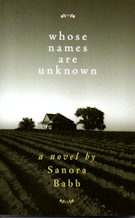Whose Names are Unknown by Sanora Babb
Set in the time of the Great Depression in 1930s America this book tells the story of the Dunne family and their neighbours. They, like many others, had been tempted to move west to farm in Oklahoma only to struggle and eventually be brought to despair by the dust storms caused in large part by the farming methods they themselves adopted. You think you’ve read this story before? You’re probably right; it’s also the plot of John Steinbeck’s great novel ‘The Grapes of Wrath’. But more on that later.
The Dunnes’ story unfolds in two parts; the first set in Oklahoma, the second in California as the Dunnes and others abandon their farms and move west in the hope of being able to make a living. Throughout, the characters are written with care and compassion. They are supportive towards each other and act with dignity even as they despair over their struggles with the weather, unreliable harvests, increasing debt and banks foreclosing on their land and property. Through all this they are trying to live normal lives: young couples fall in love and wonder how they might be able to set up home together; parents want their children to go to school; old people worry about the futures of their children and grandchildren.
And then come the dust storms. The fine dust and sand fills everything, filtering into barns, houses and lungs, covering and suffocating new crops, killing animals and people. Babb’s description is powerful and harrowing, telling the full horror of what the community had to endure.
Inevitably the time comes when they have to abandon their farm and head west. In the second part of the book they join thousands like themselves working as itinerant crop-pickers in California, moving north and south with the seasons. Treated hardly better than slave labour they are ruthlessly exploited by the big corporations who control agricultural business in the state. Unions try to organise and fight for better conditions but face strong and often violent opposition.
At the end of the book there is no resolution, no happy ending. The story has been told. Some have survived, others have not. Life goes on.
So who is Sanora Babb, and why did she write a different Grapes of Wrath? You might do well to turn the question round and ask why Steinbeck wrote a different version of Babb’s story.
Babb was born in Oklahoma in 1907 grew up as a child in Oklahoma and eastern Colorado in a farming family that faced the struggles about which she writes. Graduating from high school she was able to find work, eventually as a newspaper and magazine reporter and as a teacher in a rural school. She moved to Los Angeles in 1929 to join Associated Press as a reporter just in time for the stock market crash.
For almost the next ten years she made what living she could writing articles and stories for a variety of magazines, papers and journals. Then, quoting from the foreword to the book*,
… in 1938 she went to work as a volunteer for the Farm Security Administration … helping organise camps for the dispossessed farmers. … she kept a diary of her experiences and began a manuscript of her first novel. … Tom Collins, the founding manager of the Weedpatch migrant labour camp in Arvin … asked her to keep notes and later … [requested] a copy of them for another writer who was visiting the camp to research a novel. That writer was John Steinbeck, whom Babb reports she met twice.
No prizes for guessing what happened next. Babb sent four chapters of her her novel to Random House in New York who accepted it for publication and invited her to New York to finish it, which she did. But before it could be published, ‘The Grapes of Wrath’ was released and sold 430,000 copies in its first five months. Random House understandably and regrettably decided that given the success of ‘Grapes’ there was no room for another book on the same subject and abandoned publication.
In the foreword to the book and the publicity blurbs on the cover Babb and the publishers are careful not to accuse Steinbeck of plagiarism, so what Babb might think privately we do not know. Neither, I believe, does Steinbeck acknowledge Babb as a source. It’s so long ago that I read Steinbeck that I can’t say whether ‘Unknown’ is a better book on its subject than ‘Grapes’, but it has made a strong impression on me and I suspect that if I re-read Steinbeck I would find Babb’s account more empathetic and be inclined to say it is the better of the two.
* I have anglicised the spelling

 Title: Whose Names Are Unknown
Title: Whose Names Are Unknown
Comments
Whose Names are Unknown <i>by</i> Sanora Babb — No Comments
HTML tags allowed in your comment: <a href="" title=""> <abbr title=""> <acronym title=""> <b> <blockquote cite=""> <cite> <code> <del datetime=""> <em> <i> <q cite=""> <s> <strike> <strong>